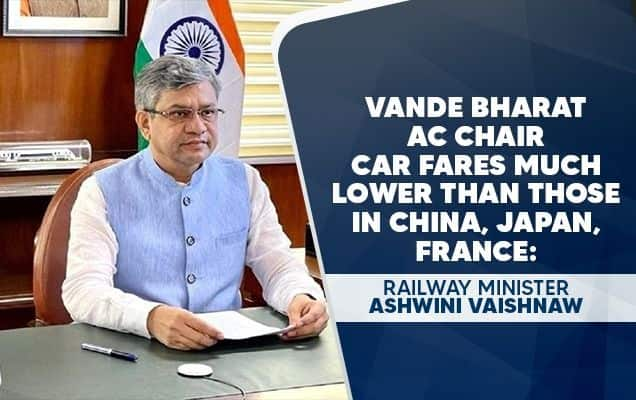Guten Abend!
Namaskar to all the attendees of the Stuttgart News9 Global Summit!
Minister Winfried, my colleague from the cabinet Jyotiraditya Scindia, and all the distinguished ladies and gentlemen present at this summit!
Today, a new chapter is being added to the Indo-German Partnership. India's TV-9 has organized this summit in collaboration with VfB Stuttgart and Baden-Württemberg here in Germany. I am pleased that an Indian media group is making efforts to connect with Germany and its people in this age of information. This initiative will provide a platform for mutual understanding between the people of Bharat and Germany. I am also delighted that the English news channel News-9 is being launched.

Friends,
The theme of this summit is "India-Germany: A Roadmap for Sustainable Growth." This theme symbolizes the responsible partnership between the two nations. Over the past two days, you have engaged in very positive discussions, not only on economic issues but also on topics related to sports and entertainment.
Friends,
Europe is a crucial strategic region for Bharat, both from the perspective of geopolitical relations and trade and investment. Germany is one of our most important partners. Indo-German Strategic Partnership marks 25 years in 2024, making this year a historic and special milestone for the partnership. Just last month, Chancellor Scholz visited Bharat for the third time. For the first time in 12 years, the Asia-Pacific Conference of German Businesses was held in New Delhi. During this conference, Germany released the Focus on India document and the Skilled Labour Strategy for India. This is the first country-specific strategy developed by Germany.
Friends,
Although the India-Germany Strategic Partnership is 25 years old, our cultural and intellectual ties go back centuries. The first Sanskrit grammar book in Europe was authored by a German. Germany became the first European country to publish books in Tamil and Telugu, thanks to two German merchants. Today, approximately 300,000 Indians live in Germany. About 50,000 Indian students are enrolled in German universities, making them the largest group of foreign students here. Another aspect of Bharat-Germany relations is seen in Bharat. Over 1,800 German companies operate in Bharat, investing around $15 billion in the past three to four years. The bilateral trade between the two countries stands at about $34 billion, and I am confident this will grow in the coming years. This belief stems from the steadily strengthening partnership between Bharat and Germany in recent years.

Friends,
Today, Bharat is the world's fastest-growing large economy. Every nation aspires to partner with Bharat for its growth. Germany's Focus on India document is a significant example of this. This document reflects how the entire world is acknowledging Bharat’s strategic importance. This change in perception is a result of Bharat’s mantra of Reform, Perform, Transform pursued over the past decade. Bharat has implemented new policies across all sectors to prepare for rapid 21st-century growth. We eliminated red tape, improved the ease of doing business, and reduced over 30,000 compliances. Bharat has strengthened the banking system to provide affordable and timely capital for development. We simplified the tax system with an efficient GST framework and created a progressive and stable policy-making environment to foster business growth. Today, Bharat has laid a solid foundation upon which the grand edifice of a ‘Viksit Bharat’ (Developed India) will be built, and Germany will remain a trusted partner in this journey.
Friends,
Manufacturing and engineering have been pivotal in Germany's development journey. Bharat, too, is moving towards becoming a major manufacturing hub globally. Manufacturers joining the ‘Make in India’ initiative are being incentivized with production-linked incentives. I'm pleased to share that our manufacturing landscape has transformed significantly. Today, Bharat is one of the leading nations in mobile and electronics manufacturing. Today, Bharat is the largest two-wheeler manufacturer, the second-largest in steel and cement, and the fourth-largest in four-wheelers. Bharat’s semiconductor industry is also poised to make its mark globally. This progress has been driven by consistent policies and new decisions focused on infrastructure improvement, logistics cost reduction, ease of doing business, and stable governance. A nation's rapid development requires investments in physical, social, and digital infrastructure, and Bharat is advancing on all these fronts. Today the world is seeing the impact of our investment and innovation on digital technology. Bharat is a country with the most unique digital public infrastructure in the world.

Friends,
There are numerous German companies in Bharat today, and I invite them to expand their investments. I also extend an invitation to German companies yet to establish a base in Bharat. As I mentioned during the Asia-Pacific Conference of German companies in Delhi, this is the right time to partner with Bharat. Bharat’s dynamism combined with Germany's precision, Germany's engineering paired with Bharat’s innovation—this synergy should be our collective goal. As one of the world's ancient civilizations, we have always welcomed people from across the globe and made them part of its journey. I invite you to join us in building a prosperous future for the world.
Thank you!
Danke!













